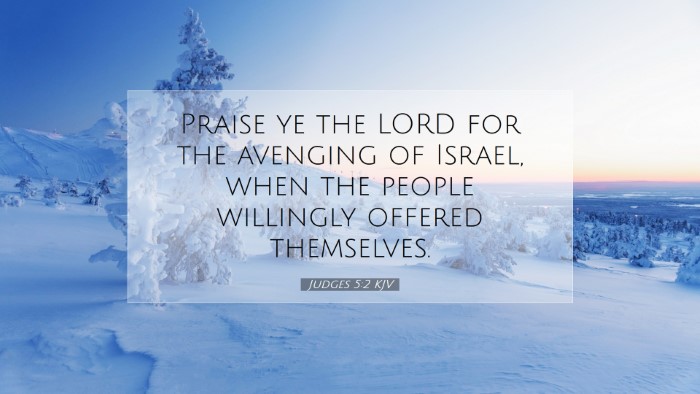Commentary on Judges 5:2
Judges 5:2 states:
"When the leaders take the lead in Israel, when the people willingly offer themselves—bless the LORD!"
This verse serves as an introduction to the Song of Deborah. It highlights key themes of leadership, communal involvement, and divine acknowledgment. The context emphasizes not merely the victory in battle, but the conditions that allowed such victory to unfold—namely, the unity and willingness of Israel's leaders and people.
Insights from Matthew Henry
Leadership and Praise: Matthew Henry remarks on the significance of strong leadership in Israel's success. He notes that when leaders “take the lead,” it signifies more than just military action; it reflects a moral and spiritual call to guide the people toward righteousness. Accordingly, the response of the people—willing surrender and enthusiasm—is a testament to effective leadership that inspires a collective commitment to the divine cause.
Willingness to Serve: Henry emphasizes that the willingness of the people to offer themselves is an act of voluntary dedication to God. This underscores a critical principle: genuine service and dedication arise from willingness, not compulsion. Thus, it is significant that the community is called blessed as they engage in God’s plans with glad hearts.
Insights from Albert Barnes
Albert Barnes provides a historical perspective, illustrating how the entire context of Judges depicts periods of distress followed by deliverance. In this verse, the opening lines of Deborah's song mark a moment when the Israelites, traditionally troubled by oppression, recognize their deliverance.
Collective Responsibility: Barnes highlights that the verse communicates a profound truth about communal responsibility: when leaders actively engage in their roles, the populace is moved to respond positively. The idea that leaders “take the lead” also relates to the moral obligation of those in authority to lead by example.
The Role of Divine Acknowledgment: Barnes also notes that the Blessing of the Lord is not an idle phrase; it suggests a deep acknowledgment of God's sovereignty in their collective triumph. When leaders and the people align themselves with God's purpose, blessings follow naturally as a consequence of that alignment.
Insights from Adam Clarke
Adam Clarke's commentary elaborates on the linguistic nuances of the Hebrew text. He points out that the phrase “when the leaders take the lead” implies a proactive stance—suggesting a sense of readiness among the heads of tribes. This readiness often leads to greater accomplishments in the spiritual and communal life of Israel.
Inspiration and Mobilization: Clarke asserts that spiritual victories often precede physical ones. The leaders’ willingness to rise up and fight symbolically reflects a deeper readiness for spiritual warfare. The mobilization of both leaders and people indicates a symbiotic relationship in Israel's faith journey—each has a role and vital place within the divine plan.
Theological Reflections
Theologians will find critical reflections concerning the nature of leadership within the church today. Just as Deborah led with authority and fought for justice, contemporary leaders are called to embody spiritual integrity and lead by example.
Community Engagement: This passage challenges modern readers to consider their own engagement in their communities. Leaders must inspire unity and encourage willing participation among their followers, fostering an environment ripe for God’s blessings.
Divine Sovereignty and Human Agency: Judges 5:2 showcases the interplay between divine sovereignty and human agency. God's blessings are evident when leaders and followers align with His purpose, affirming that God works through human cooperation.
Conclusion
In conclusion, Judges 5:2 encapsulates the essence of leadership and communal engagement that is vital in both the historical context of Israel and the contemporary church. Through the insights gained from public domain commentaries by Matthew Henry, Albert Barnes, and Adam Clarke, the verse emphasizes the mutually beneficial relationship between leaders and their communities in faithfully serving God.
Therefore, it serves as a profound reminder for pastors, students, theologians, and Bible scholars alike, urging them to cultivate willing hearts within the church and to lead with sincerity and purpose, always recognizing that such engagement invites divine blessing.


